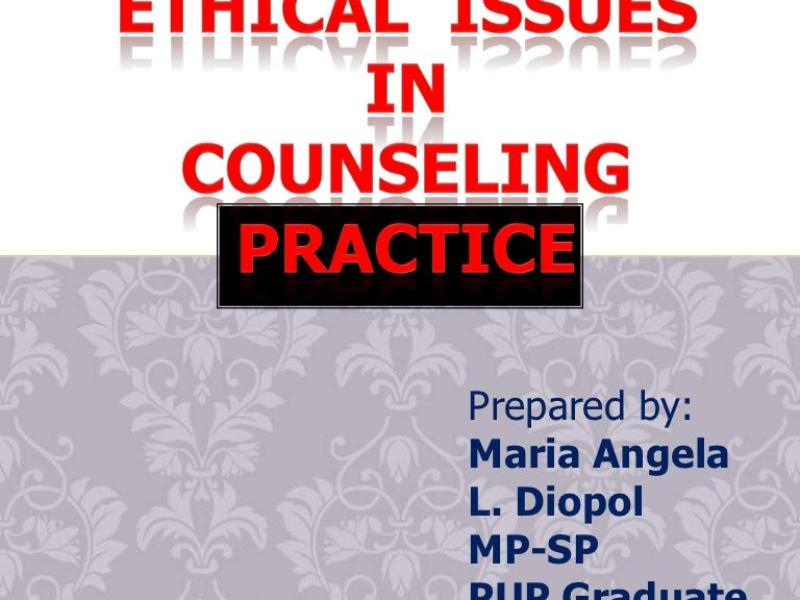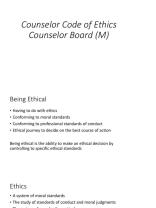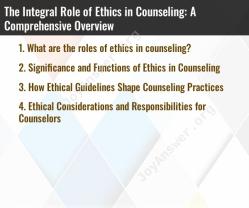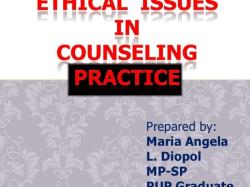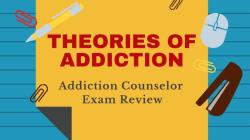What is counselor ethics?
Counselor ethics refers to the principles, guidelines, and standards of conduct that guide the professional behavior of counselors. Ethical considerations are essential in the field of counseling to ensure the well-being and rights of clients, maintain the integrity of the counseling profession, and establish trust between counselors and their clients. Ethical guidelines provide a framework for responsible and competent practice, addressing various aspects of the counselor-client relationship and the broader professional context.
Key elements of counselor ethics include:
Confidentiality:
- Confidentiality is a fundamental ethical principle in counseling. Counselors are expected to protect the privacy of their clients by keeping information shared during counseling sessions confidential. Exceptions to confidentiality may exist in situations involving imminent harm to the client or others.
Informed Consent:
- Counselors are required to obtain informed consent from clients before initiating counseling services. Informed consent involves providing clients with relevant information about the counseling process, including the purpose of counseling, the counselor's approach, potential risks and benefits, and the limits of confidentiality.
Competence:
- Counselors are ethically obligated to maintain a high level of professional competence. This includes ongoing professional development, staying informed about current best practices, and recognizing the limits of one's expertise. Counselors should refer clients to other professionals when appropriate.
Non-Discrimination and Cultural Competence:
- Ethical guidelines emphasize the importance of providing services without discrimination and being culturally competent. Counselors should be aware of their own biases, respect the diversity of clients, and strive to create an inclusive and affirming environment.
Boundaries:
- Maintaining appropriate professional boundaries is crucial in counseling. Counselors should avoid dual relationships that could compromise objectivity or harm the therapeutic relationship. This includes avoiding personal, familial, or social relationships with clients that could impair professional judgment.
Avoiding Harm:
- Counselors have a responsibility to avoid causing harm to their clients. This involves using ethical judgment in selecting interventions, being aware of the potential impact of counseling methods, and monitoring for any adverse effects.
Social Justice and Advocacy:
- Counselors are encouraged to promote social justice and advocate for the rights and well-being of their clients. This may involve addressing systemic issues that contribute to clients' challenges and advocating for policies that enhance social equity.
Professional Integrity:
- Professional integrity involves honesty, transparency, and maintaining the trust of clients. Counselors should provide accurate information, avoid conflicts of interest, and uphold the values of the counseling profession.
Supervision and Consultation:
- Counselors in training and practicing counselors are encouraged to seek supervision and consultation to enhance their professional competence. Supervision provides a space for reflection, guidance, and feedback to support ethical practice.
Legal Compliance:
- Counselors are expected to be aware of and comply with relevant laws and regulations governing the practice of counseling in their jurisdiction. This includes understanding licensing requirements and staying informed about changes in the legal landscape.
The specific ethical guidelines that counselors follow can vary based on their professional affiliations (e.g., American Counseling Association, National Association of Social Workers) and the specific code of ethics associated with their profession. It's essential for counselors to be familiar with and adhere to the ethical standards relevant to their practice. Violations of ethical standards can result in professional consequences, including disciplinary action and the loss of licensure.
Understanding the Fundamental Principles of Counselor Ethics
Counseling ethics serve as a crucial framework for professional conduct, ensuring the well-being of clients and protecting their rights. Here are some key principles you should understand:
1. Respect for Client Autonomy:
- Counselors respect clients' right to make their own decisions, even if they disagree with them.
- Clients should be fully informed about options and consequences before making choices.
2. Informed Consent:
- Clients have the right to understand the nature and purpose of counseling, potential risks and benefits, and alternative options before agreeing to participate.
- Consent should be voluntary and ongoing, with the right to withdraw at any time.
3. Confidentiality:
- Client information, including conversations, records, and assessments, must be kept confidential with limited exceptions (e.g., imminent danger to self or others).
- Client privacy should be maintained even in consultations or supervision.
4. Non-Maleficence and Beneficence:
- Counselors must do no harm and actively strive to promote clients' well-being.
- This involves careful assessments, using safe and evidence-based practices, and avoiding harmful interventions.
5. Professional Integrity and Responsibility:
- Counselors uphold ethical standards, are honest and fair in their interactions, and avoid exploitation or conflicts of interest.
- They engage in ongoing professional development, maintaining competence and seeking consultation when needed.
6. Cultural Competence:
- Counselors recognize and respect cultural diversity, avoid personal biases, and adapt their approach based on clients' cultural backgrounds and values.
- This includes seeking additional training and resources to enhance cultural understanding.
7. Social Justice:
- Counselors advocate for social justice and challenge discrimination and oppression.
- This involves promoting equal access to services, addressing systemic inequalities, and advocating for marginalized communities.
How Ethics Guide Counselors in Professional Practice
These principles translate into everyday practice in numerous ways:
- Screening for and managing conflicts of interest: Counselors may refer clients to other professionals if a personal or professional relationship becomes detrimental to the therapeutic relationship.
- Dealing with potential boundary violations: Maintaining appropriate professional boundaries protects both the client and the counselor. Avoiding dual relationships, gifts, or inappropriate physical contact is crucial.
- Addressing ethical dilemmas: When faced with complex situations, counselors can utilize ethical decision-making models, seek consultation from supervisors or colleagues, and carefully consider relevant ethical principles.
- Reporting unethical behavior: Counselors have a responsibility to report suspected ethical violations by colleagues to ensure the integrity of the profession.
Real-life Applications of Ethical Standards in Counseling
Here are some scenarios showcasing how ethical principles apply in practice:
- Case 1: Confidentiality and Reporting: A client discloses plans to harm themselves. While respecting confidentiality, the counselor must assess the immediate risk and, if necessary, prioritize client safety by informing appropriate authorities.
- Case 2: Informed Consent and Cultural Competence: A counselor working with a first-generation immigrant client ensures informed consent by providing written materials in the client's preferred language and explaining procedures in culturally sensitive ways.
- Case 3: Social Justice and Advocacy: A counselor working with a community experiencing environmental hazards advocates for clean water access and collaborates with community organizations to address systemic inequalities.
Remember, ethical practice is an ongoing process. Counselors should continuously examine their actions and reflect on how they adhere to ethical principles. Seeking ongoing supervision, engaging in professional development, and maintaining awareness of emerging ethical issues are essential for upholding the highest standards of care in counseling.
I hope this gives you a clear understanding of fundamental counselor ethics principles and their real-world applications. Feel free to ask further questions about specific ethical dilemmas or aspects that you'd like to explore further.
